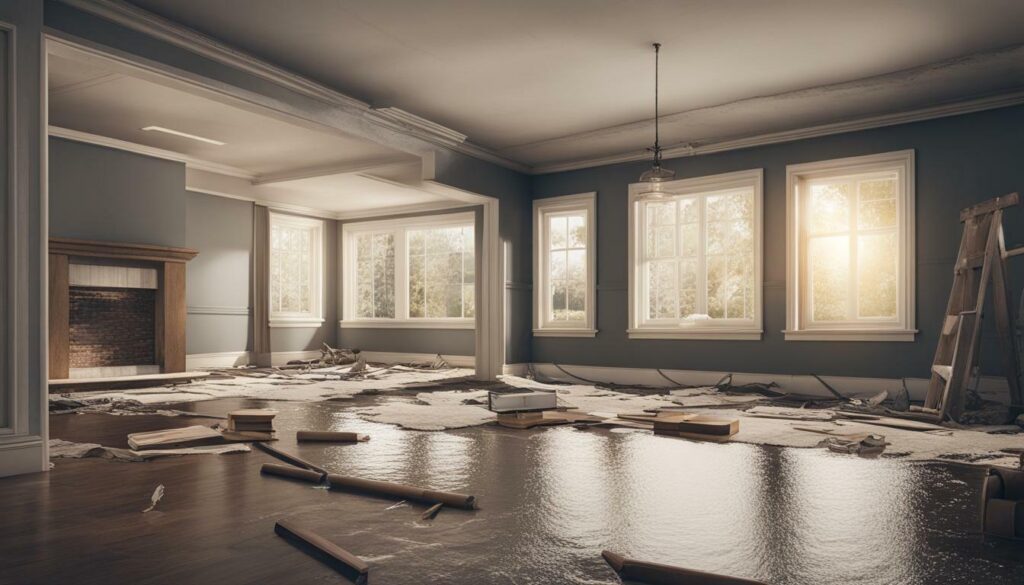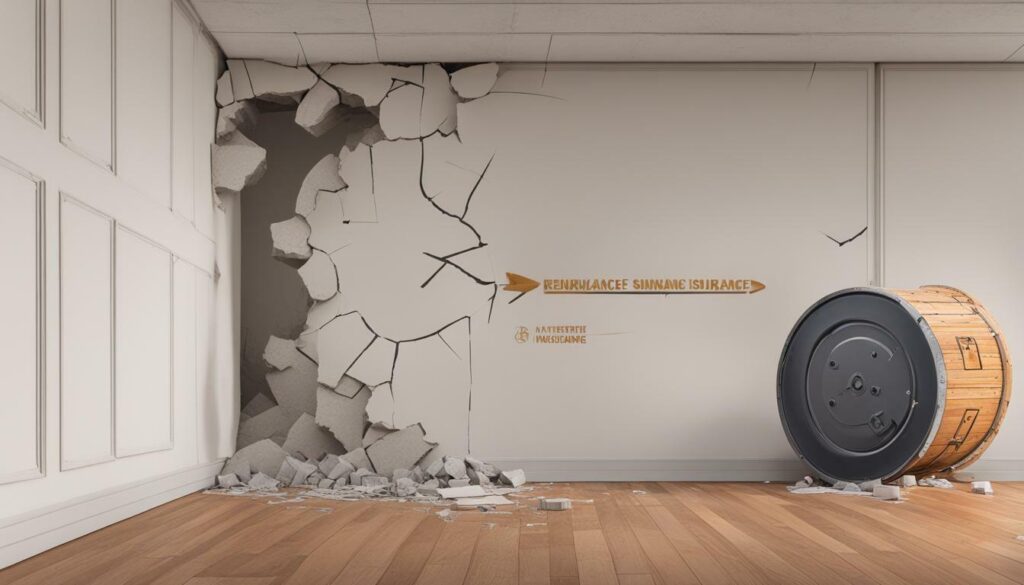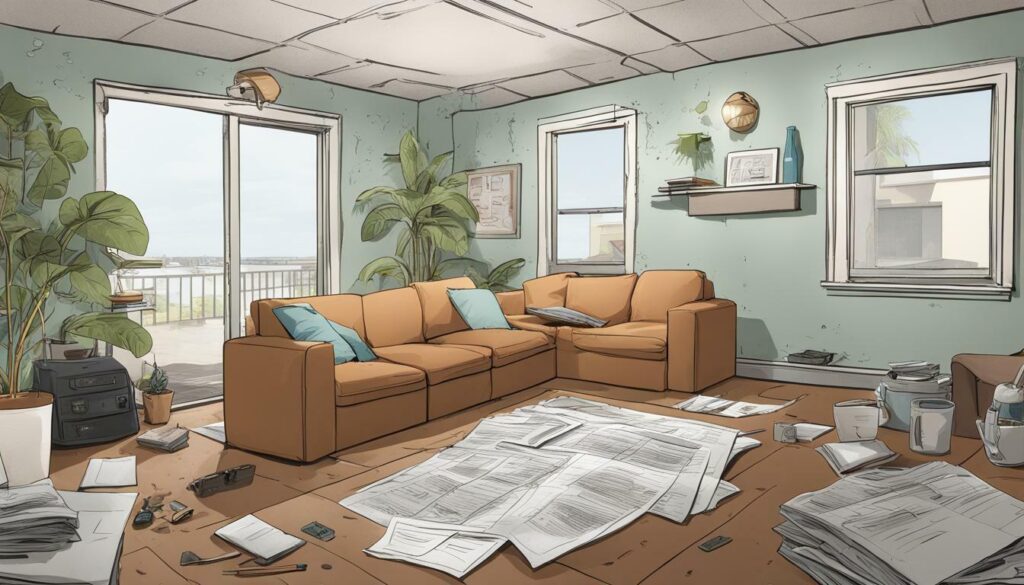When it comes to protecting your home and belongings, insurance coverage is essential. However, did you know that there are two specific disasters that are typically not covered by renters or homeowners insurance policies?
Understanding these exclusions is crucial in ensuring you have adequate protection in the face of uncertainty. Read on to explore what these two disasters are and how you can protect yourself.
Key Takeaways:
- What two disasters are not covered by renters or homeowners insurance?
- Understanding disaster exclusions in insurance policies is crucial for homeowners and renters.
- Additional coverage options may be necessary to ensure comprehensive insurance coverage.
Understanding Disaster Exclusions in Insurance Policies
While renters and homeowners insurance provide essential coverage for many types of disasters, it’s important to understand that not all events are covered. These exclusions can leave you vulnerable to significant financial losses if disaster strikes.
Disaster insurance coverage varies by policy and provider, but some of the exclusions commonly found in renters and homeowners insurance policies include:
- Earthquakes
- Floods
- Mold
- Nuclear accidents
- Sinkholes
- Terrorist attacks
- War or military action
It’s important to carefully review your policy and understand any exclusions that may apply. For example, while renters insurance typically covers theft and damage caused by fire, it may not cover losses due to flooding or earthquakes.
Homeowners insurance policies typically provide greater coverage than renters insurance but may still exclude certain disasters. For example, a standard homeowners insurance policy may not cover losses due to flooding or sewer backups.
Given the potential financial impact of uncovered disasters, it’s important to explore additional coverage options to ensure comprehensive protection for your home and belongings.
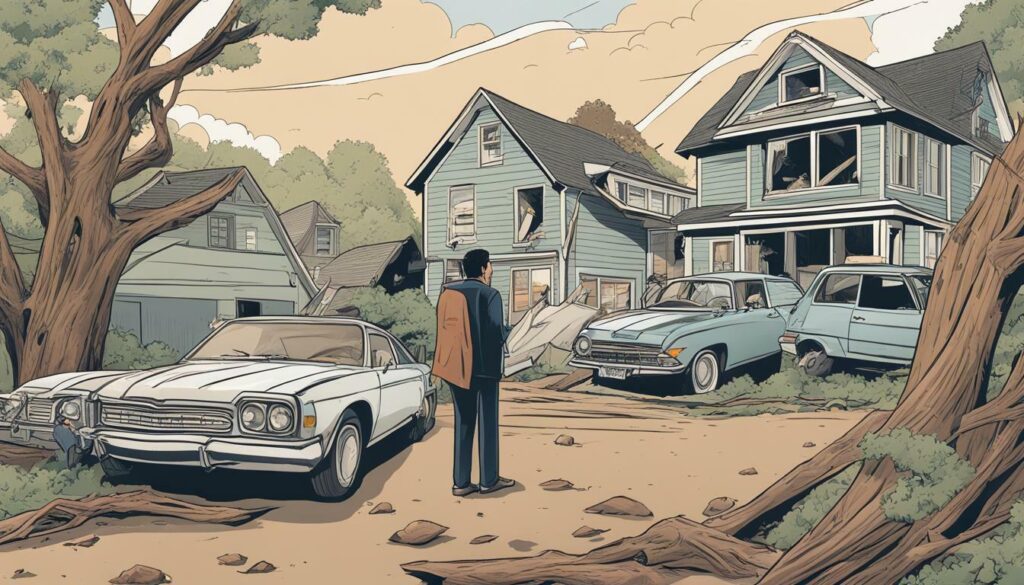

One of the most common ways to supplement your coverage is through disaster insurance policies that provide specific protection for excluded events. For example, earthquake insurance can help you cover the costs of damage and rebuilding in the event of an earthquake, while flood insurance can protect your home and belongings from flood-related losses.
It’s also important to note that while additional coverage may come at an additional cost, the peace of mind that comes with comprehensive protection is invaluable.
Working with insurance agents or experts can help you understand your policy and evaluate your coverage needs. They can also help you identify any gaps in your coverage and explore additional options to ensure comprehensive protection.
Don’t wait until disaster strikes to find out that you’re not fully covered. Take the time to review your policy, explore your options, and ensure that you have the protection you need for any potential disaster.
Natural Disasters Not Covered by Insurance
While your renters or homeowners insurance policy provides coverage for a range of disasters, it’s important to note that it does not cover all types of natural disasters. Understanding what is not covered by your policy can help you make informed decisions about additional insurance options.
Two of the most common natural disasters that are not covered by standard renters or homeowners insurance policies include:
| Type of Disaster | Explanation |
|---|---|
| Flood | Most standard renters or homeowners insurance policies exclude damage caused by flooding. This means that if your property is damaged due to a flood, you will likely not receive any compensation from your insurer. |
| Earthquake | Another disaster that is typically not covered by standard renters or homeowners insurance policies is earthquake damage. If an earthquake causes damage to your property, you will not be able to file a claim with your insurer unless you have additional earthquake insurance. |
It’s important to note that there may be other types of disasters not covered by your policy, such as hurricanes or wildfires. Understanding these common disaster exclusions is the first step in ensuring your home and belongings are protected from all potential threats.
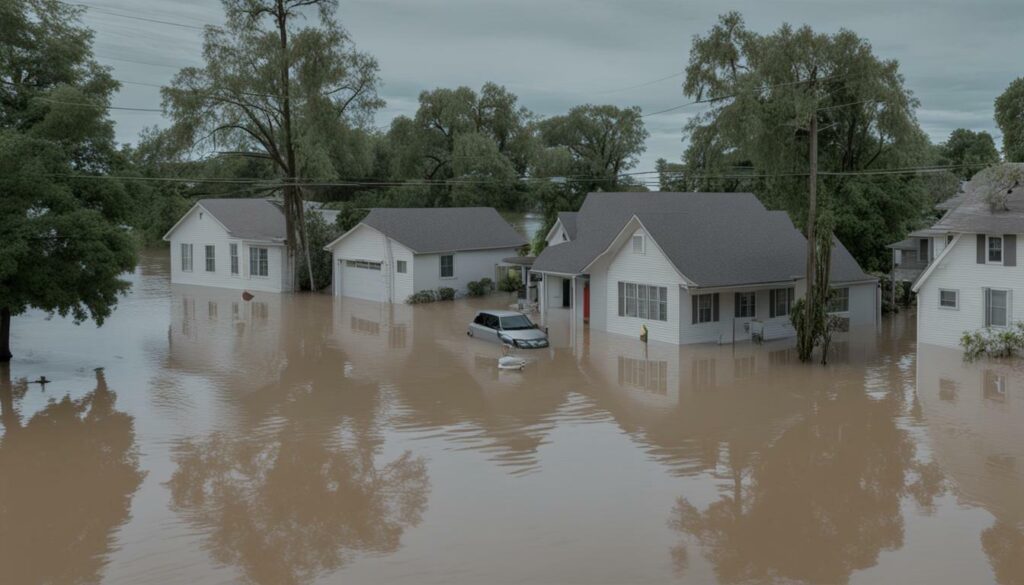

Without proper coverage, natural disasters can have devastating effects on your finances and living situation. To ensure comprehensive protection, consider exploring supplementary insurance options that provide coverage for these disasters not included in standard policies.
Flood Coverage and Insurance Options
If you live in an area prone to flooding, it’s important to understand that standard renters or homeowners insurance policies typically do not provide coverage for flood damage.
So, what is flood insurance, and how does it differ from your standard insurance policy?
Flood insurance is a separate policy that provides coverage specifically for damage caused by floods. It can be purchased through the National Flood Insurance Program (NFIP) or private insurance companies.
If you are a renter, you can purchase renters flood insurance to protect your personal belongings in the event of a flood. Homeowners can purchase homeowners flood insurance to cover both their property and personal belongings.
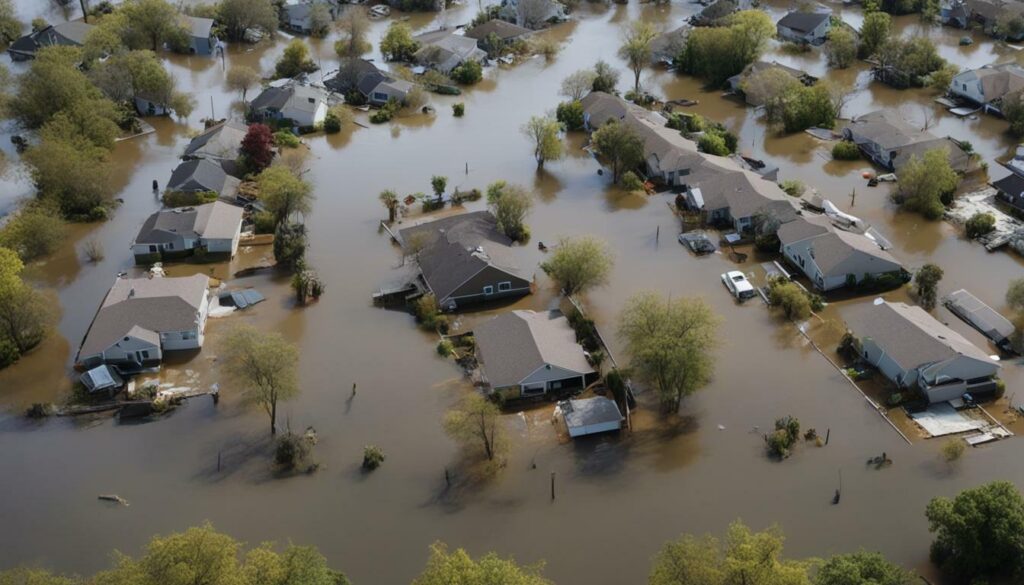

When considering flood insurance, it’s important to note that there is typically a 30-day waiting period before coverage takes effect, so it’s essential to purchase it before a flood warning is issued.
It’s also important to evaluate your coverage needs carefully, as flood insurance can be expensive. However, the cost may be worth it to ensure protection against the devastating effects of flooding.
Earthquake Coverage and Insurance Options
Earthquakes are a natural disaster that can cause significant damage to your property. Unfortunately, standard renters and homeowners insurance policies typically do not cover earthquake damage. This means that if you live in an area prone to earthquakes, you may need to consider additional coverage options.
Earthquake insurance is a specific type of insurance that provides coverage for earthquake damage to your home and personal property. This type of insurance is typically purchased as a separate policy and can be added to your existing renters or homeowners insurance.
If you are a renter, you may be able to purchase earthquake insurance as a rider to your renters insurance policy. This type of coverage can provide protection for your personal belongings in the event of an earthquake. Homeowners, on the other hand, may need to purchase a separate earthquake insurance policy to cover the cost of repairing any damage caused by an earthquake.
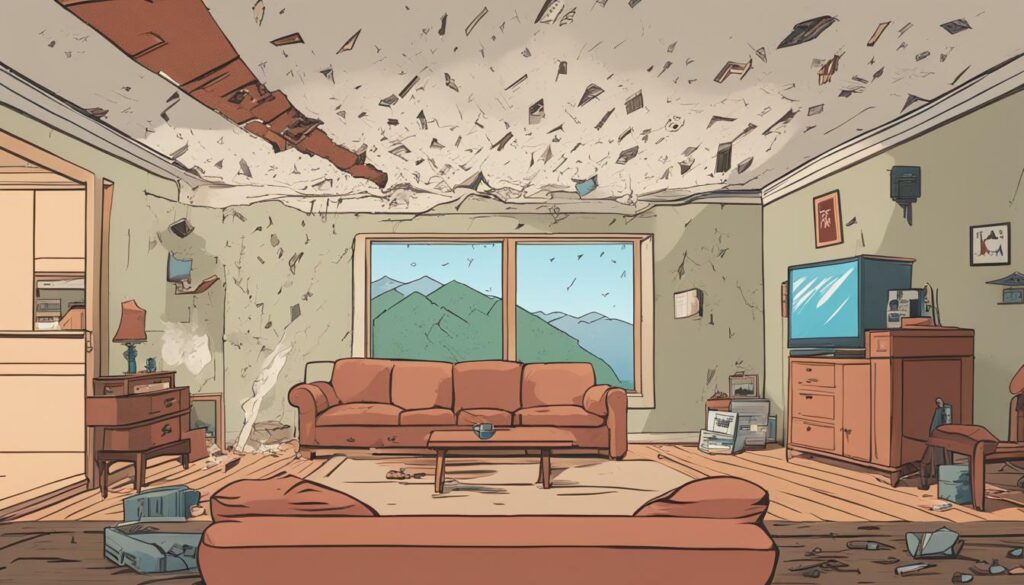

When considering earthquake coverage, it is important to understand the specific terms and limitations of the policy, including the deductible and coverage limits. Some earthquake insurance policies may have higher deductibles and lower coverage limits than traditional homeowners or renters insurance policies, so it is important to carefully review the policy before purchasing.
Overall, if you live in an area prone to earthquakes, earthquake insurance can provide valuable protection for your home and personal belongings. Consider discussing your options with an insurance expert to determine the best coverage for your specific situation.
Other Disasters not Covered by Insurance
Besides natural disasters such as floods and earthquakes, there are other types of disasters that may not be covered by standard renters or homeowners insurance policies. These include:
- War or nuclear incidents
- Terrorist attacks
- Sinkholes
- Mold, rot, and pest damage
- Power outages caused by utility failure
It is important to note that coverage for these disasters may be available through supplementary insurance policies. For example, you can purchase a terrorism insurance policy to protect against losses resulting from terrorist attacks.
Other options may include additional coverage for mold or sinkhole damage. Talking to insurance experts can help you evaluate your risks and determine the types of coverage that make sense for your situation.
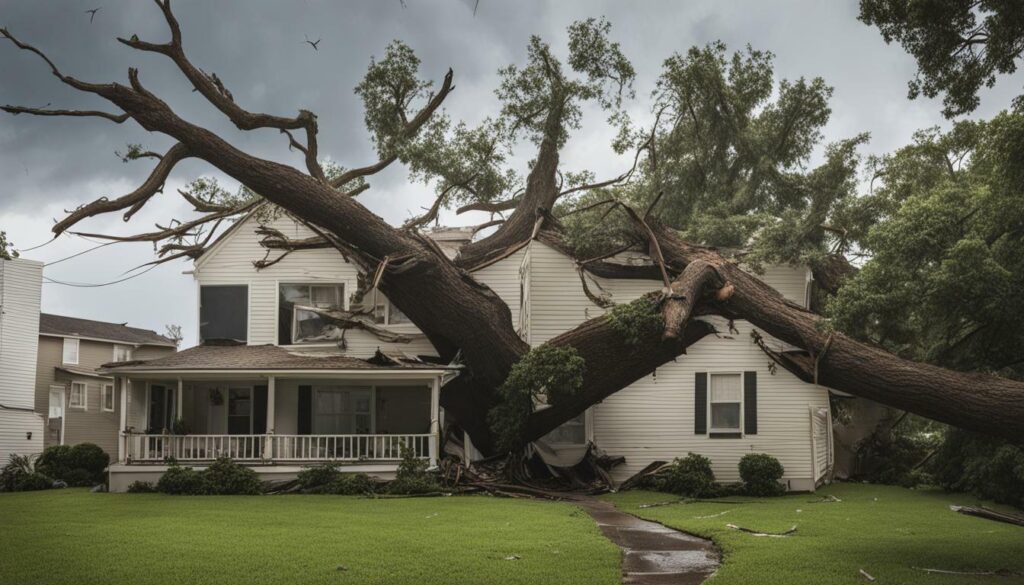

Evaluating Additional Coverage Needs
Now that you are aware of the specific disasters not covered by your renters or homeowners insurance, it’s time to assess your coverage needs. Evaluating your coverage requirements is important to ensure that you have adequate protection in the face of uncertainty.
Start by reviewing your existing insurance policies and determining any insurance gaps that may exist. You can then explore additional coverage options to fill these gaps and safeguard your property and belongings.
Factors that may impact your coverage needs include the location of your property, its value, and the likelihood of certain disasters occurring in your area. For example, if your home is located in a flood-prone area, you may need to consider adding flood insurance to your existing policy.
By assessing your coverage needs and determining any gaps in your insurance policies, you can make informed decisions about adding additional coverage options. Remember to periodically review and update your coverage as your needs change over time.
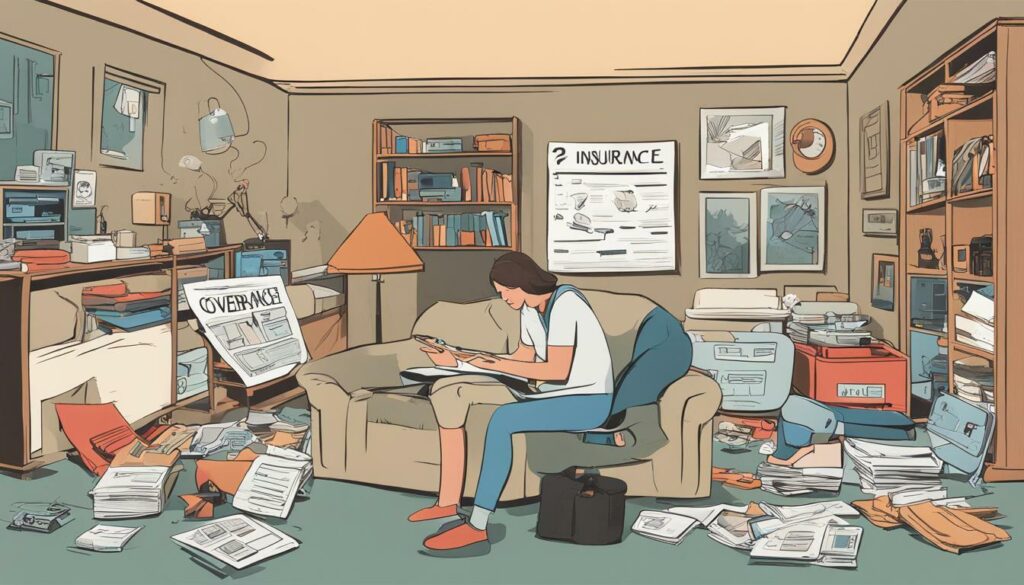

“Evaluating your coverage needs is crucial in ensuring that you have adequate protection in the face of uncertainty.”
Supplementing Coverage with Additional Insurance Policies
Standard renters or homeowners insurance policies have exclusions for certain disasters, leaving gaps in coverage that can leave you vulnerable in times of crisis. To ensure comprehensive protection, it may be necessary to supplement your existing insurance with additional policies that provide specific coverage for these excluded events.
Supplemental insurance policies can help fill these gaps and provide additional coverage for disasters not included in standard policies. For example, disaster insurance is a type of coverage that specifically protects against natural disasters such as floods, earthquakes, and hurricanes.
If you live in an area that is prone to a particular type of disaster, such as earthquakes, you may want to consider purchasing disaster-specific insurance. This type of coverage is designed to protect your home and belongings against the specific risks associated with the event.
When considering supplemental insurance policies, it is important to assess your individual needs and determine which types of coverage are most relevant to your circumstances. Speak to an insurance agent or expert to get professional guidance on the best options for your unique situation.
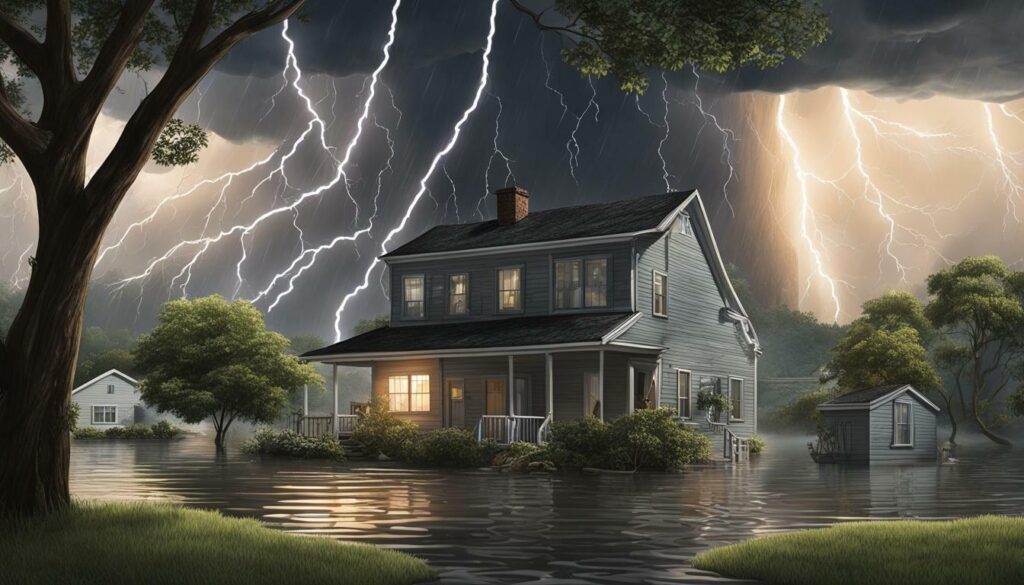

| Benefits of Supplemental Insurance Policies | Considerations When Purchasing Supplemental Insurance Policies |
|---|---|
|
|
Supplemental insurance policies can be a valuable addition to your renters or homeowners insurance coverage. By assessing your needs, working with insurance experts, and reviewing your policies regularly, you can ensure that you have comprehensive coverage to protect your property and belongings against any unexpected disasters.
Working with Insurance Agents and Experts
When it comes to understanding the complexities of insurance coverage for disasters, seeking professional advice can be extremely beneficial. Insurance experts and agents can help you assess your current coverage, identify any potential gaps, and determine the best supplemental insurance options for your needs.
Insurance agents can also provide guidance on how to file a claim and what to expect during the claims process. They can explain any confusing insurance jargon and answer any questions you may have about your policy.
Be sure to work with a reputable insurance agent or expert. Look for professionals with a proven track record of delivering quality service and support to their clients. You want someone who will take the time to understand your unique situation and provide tailored recommendations to ensure you have the right insurance coverage in place.


Ultimately, working with insurance agents and experts can give you peace of mind, knowing that you have the proper coverage for your home and belongings. Don’t hesitate to reach out for professional advice on your coverage options.
Periodically Reviewing and Updating Your Coverage
Insurance needs can change over time, and it’s important to keep your policies up to date. Periodic review of insurance coverage can help identify any gaps in your coverage and ensure that you have the necessary protection in place. It’s recommended that you review your insurance policies at least once a year, or anytime a major life event occurs, such as buying a new home, getting married, or having children.
When reviewing your insurance policies, consider your current situation and any changes that may have occurred since you last updated your coverage. For example, if you have recently purchased expensive new furniture or electronics, you may need to increase your coverage to protect these items.
It’s also important to check that your deductibles and limits are still appropriate for your needs. Adjusting your deductibles can help lower your premiums, but it’s essential that you have enough coverage to protect your assets in case of a disaster.
Updating your policies is a straightforward process that can typically be done online or by contacting your insurance agent. Make sure to inform your agent of any changes in your circumstances that may require adjustments to your coverage.
Regularly reviewing and updating your insurance policies can ensure that you have adequate protection in place to safeguard your home, personal belongings, and yourself in the face of unforeseen events.
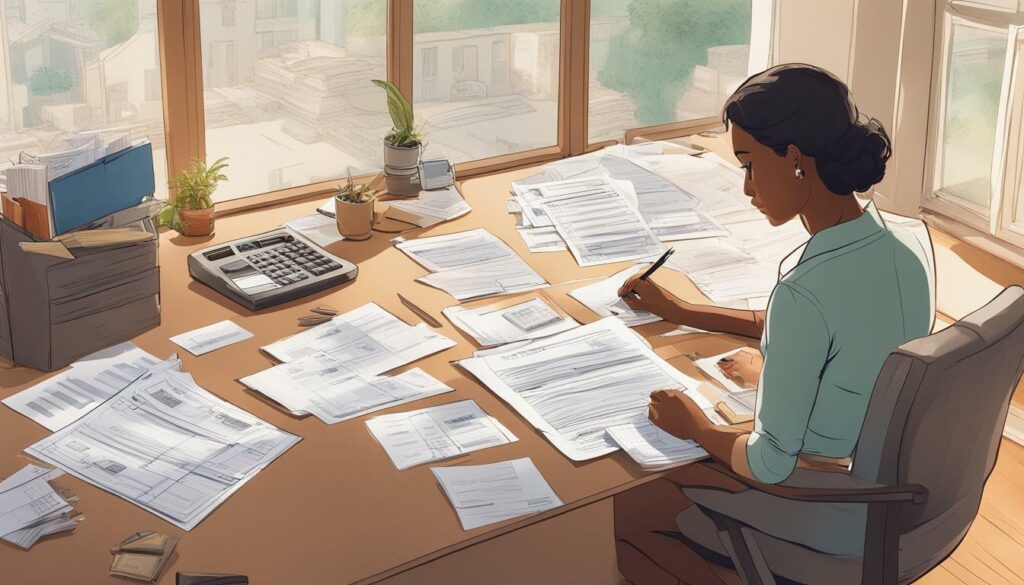

Conclusion
Understanding the limitations of your renters or homeowners insurance is crucial in protecting your property and belongings. By being aware of the two specific disasters typically excluded from standard policies, you can explore additional coverage options to ensure comprehensive insurance coverage in the face of uncertainty.
Evaluating your coverage needs and determining any insurance gaps that may exist is important in assessing your additional coverage requirements. Working with insurance agents or experts can provide valuable guidance in understanding the complexities of insurance coverage for disasters and identifying the right coverage options for your specific circumstances.
Remember to periodically review and update your insurance policies to align with your current needs and circumstances. Doing so can ensure your coverage remains adequate and up-to-date to protect against unforeseen events.
Overall, ensuring adequate insurance coverage for your property and belongings requires careful consideration, planning, and evaluation. By taking the necessary steps to protect yourself against disasters, you can have peace of mind knowing you are prepared for whatever life throws your way.
FAQ
Q: What two disasters aren’t covered by your renters or homeowners insurance?
A: The two disasters that are typically not covered by renters or homeowners insurance policies are floods and earthquakes.
Q: What are the exclusions found in renters and homeowners insurance policies?
A: Renters and homeowners insurance policies often exclude coverage for natural disasters such as floods and earthquakes. Additionally, other types of disasters may also be excluded, such as wildfires, hurricanes, and tornadoes.
Q: What natural disasters are not covered by insurance?
A: Natural disasters that are typically not covered by renters or homeowners insurance include floods, earthquakes, wildfires, hurricanes, and tornadoes.
Q: Is there insurance coverage available for floods?
A: Floods are not covered by standard renters or homeowners insurance policies, but you can purchase separate flood insurance to protect your home and belongings from flood damage.
Q: Are earthquakes covered by renters or homeowners insurance?
A: Earthquakes are typically excluded from renters and homeowners insurance policies. However, you can obtain earthquake insurance as a separate policy to ensure coverage for earthquake-related damages.
Q: Besides floods and earthquakes, what other disasters may not be covered by insurance?
A: In addition to floods and earthquakes, other disasters that may not be covered by standard renters or homeowners insurance policies include wildfires, hurricanes, tornadoes, and acts of terrorism.
Q: How can I assess my additional coverage needs?
A: It is important to evaluate your coverage requirements by considering the types of disasters that are not covered by your current insurance policy. This assessment can help you identify any insurance gaps and determine the need for additional coverage.
Q: Can I supplement my renters or homeowners insurance with additional policies?
A: Yes, to ensure comprehensive coverage, you can supplement your existing renters or homeowners insurance with additional policies that provide specific coverage for disasters not included in standard policies, such as flood insurance or earthquake insurance.
Q: Should I consult insurance agents or experts for professional advice on coverage?
A: Seeking guidance from insurance agents or experts can be beneficial in understanding the complexities of insurance coverage for disasters. They can provide valuable advice and help you make informed decisions about your coverage needs.
Q: How often should I review and update my insurance coverage?
A: It is important to periodically review and update your insurance coverage to ensure it aligns with your current circumstances. Changes in your home, belongings, or coverage needs may require adjustments to your policy. It is recommended to review your insurance annually or whenever significant changes occur.
Conclusion
In conclusion, floods and earthquakes are the two specific disasters not covered by renters or homeowners insurance. Understanding these exclusions and exploring additional coverage options, such as flood insurance and earthquake insurance, is crucial to ensure comprehensive insurance coverage for your home and belongings.

